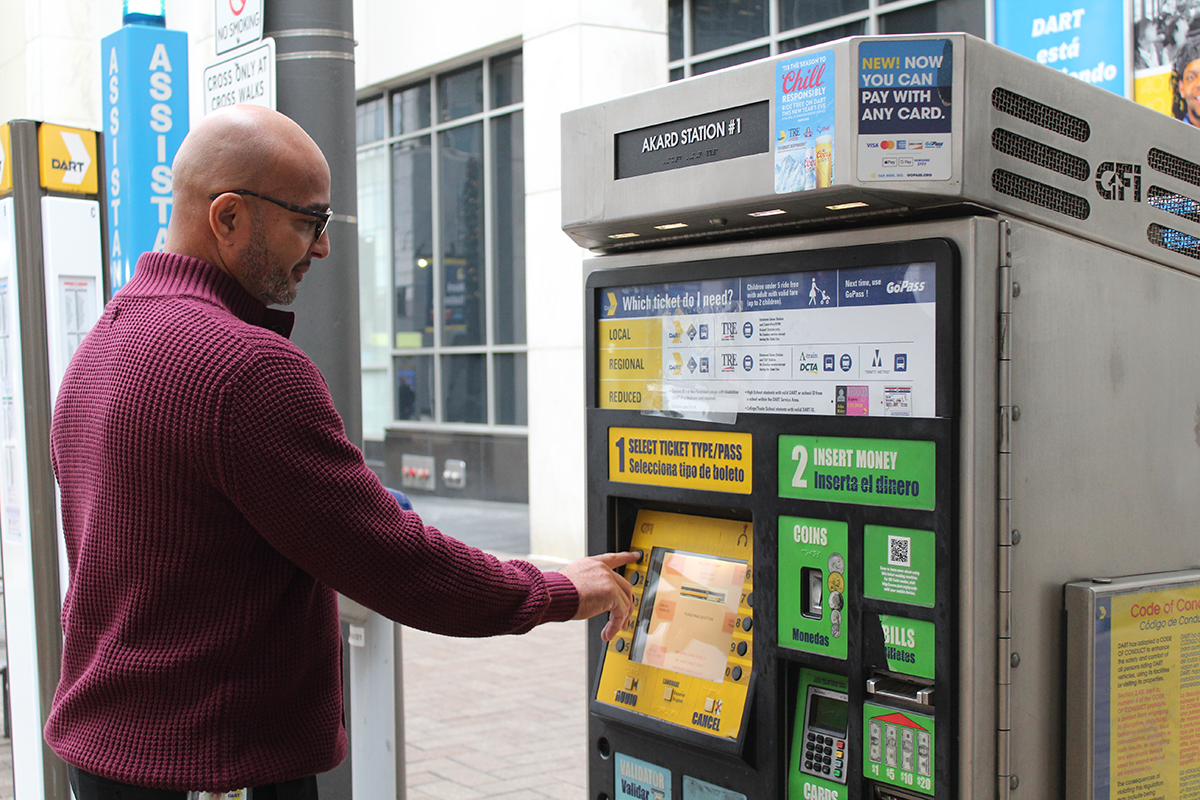- Ask DART
- About
- News
Fare Change Supports Expanded and Improved Transit Service
 DART Rider using the TVM
DART Rider using the TVM
Our Board-approved 20-Year Financial Plan incorporates projected fare revenue as part of the agency’s total income. It is part of what is put toward bond obligations, operating the existing and improved transit system, and covering expenses for maintenance and modernization. The recommended fare change is designed to provide additional fare revenue with minimal impact on ridership.
 Over the past two years, we have looked at existing conditions, compared DART’s fares to those of peer transit agencies, and gathered feedback from public outreach. For example, riders told us our fare options were too complex and they were confused as to what fare to buy when, especially when transfers were involved.
Over the past two years, we have looked at existing conditions, compared DART’s fares to those of peer transit agencies, and gathered feedback from public outreach. For example, riders told us our fare options were too complex and they were confused as to what fare to buy when, especially when transfers were involved.The recommended fare structure:
- Includes no increase in the cost of a day pass.
- Simplifies and consolidates the various partial-day passes into one 3-hour pass.
- Introduces new reduced fares and bulk discount programs.
- Increases the cost of a month pass and implements a fare increase to paratransit service that the DART Board approved but did not enact in 2018.
As before, riders who use a fare payment method that provides fare capping will receive the most benefit.
The last fare change occurred in August 2018. DART planned to implement small fare increases every 3-5 years, but as the pandemic began the agency decided to postpone the scheduled increase to reduce the economic burden on our riders.
Public input on the proposed fare structure is needed
 DART is gathering public input on the proposed changes to the agency’s local fare structure during July and August, leading up to a formal public hearing on Tuesday, Aug. 27, at 6 p.m. at DART Headquarters. The DART Board of Directors will consider all submitted comments before they make a final decision.
DART is gathering public input on the proposed changes to the agency’s local fare structure during July and August, leading up to a formal public hearing on Tuesday, Aug. 27, at 6 p.m. at DART Headquarters. The DART Board of Directors will consider all submitted comments before they make a final decision.Rider feedback does have an influence on the DART Board members. For example, in 2018, we proposed eliminating the day pass since riders could buy two AM/PM passes daily instead. After a sizable number of riders told us they preferred to buy one pass each day, the DART Board decided to keep the day pass option.
We encourage you to review the proposed changes and submit your feedback in one of these ways:

- Online at DART.org/FareUpdates
- By email to [email protected]
- In person at a Pre-Public Hearing Community Meeting or Open House event
- Mail in a comment card in the brochures found on buses, trains, and transit centers.
Implementation of the new fare structure is slated for March 1, 2025. Changes to any program that operates on a calendar year, such as the Corporate Annual Pass or Educational Institution Semester Pass, would begin on Jan. 1, 2025.
Categories : Leading Mobility - Community
Fare Change Supports Expanded and Improved Transit Service
 DART Rider using the TVM
DART Rider using the TVM
Our Board-approved 20-Year Financial Plan incorporates projected fare revenue as part of the agency’s total income. It is part of what is put toward bond obligations, operating the existing and improved transit system, and covering expenses for maintenance and modernization. The recommended fare change is designed to provide additional fare revenue with minimal impact on ridership.
 Over the past two years, we have looked at existing conditions, compared DART’s fares to those of peer transit agencies, and gathered feedback from public outreach. For example, riders told us our fare options were too complex and they were confused as to what fare to buy when, especially when transfers were involved.
Over the past two years, we have looked at existing conditions, compared DART’s fares to those of peer transit agencies, and gathered feedback from public outreach. For example, riders told us our fare options were too complex and they were confused as to what fare to buy when, especially when transfers were involved.The recommended fare structure:
- Includes no increase in the cost of a day pass.
- Simplifies and consolidates the various partial-day passes into one 3-hour pass.
- Introduces new reduced fares and bulk discount programs.
- Increases the cost of a month pass and implements a fare increase to paratransit service that the DART Board approved but did not enact in 2018.
As before, riders who use a fare payment method that provides fare capping will receive the most benefit.
The last fare change occurred in August 2018. DART planned to implement small fare increases every 3-5 years, but as the pandemic began the agency decided to postpone the scheduled increase to reduce the economic burden on our riders.
Public input on the proposed fare structure is needed
 DART is gathering public input on the proposed changes to the agency’s local fare structure during July and August, leading up to a formal public hearing on Tuesday, Aug. 27, at 6 p.m. at DART Headquarters. The DART Board of Directors will consider all submitted comments before they make a final decision.
DART is gathering public input on the proposed changes to the agency’s local fare structure during July and August, leading up to a formal public hearing on Tuesday, Aug. 27, at 6 p.m. at DART Headquarters. The DART Board of Directors will consider all submitted comments before they make a final decision.Rider feedback does have an influence on the DART Board members. For example, in 2018, we proposed eliminating the day pass since riders could buy two AM/PM passes daily instead. After a sizable number of riders told us they preferred to buy one pass each day, the DART Board decided to keep the day pass option.
We encourage you to review the proposed changes and submit your feedback in one of these ways:

- Online at DART.org/FareUpdates
- By email to [email protected]
- In person at a Pre-Public Hearing Community Meeting or Open House event
- Mail in a comment card in the brochures found on buses, trains, and transit centers.
Implementation of the new fare structure is slated for March 1, 2025. Changes to any program that operates on a calendar year, such as the Corporate Annual Pass or Educational Institution Semester Pass, would begin on Jan. 1, 2025.
Categories : Leading Mobility - Knowledge
Fare Change Supports Expanded and Improved Transit Service
 DART Rider using the TVM
DART Rider using the TVM
Our Board-approved 20-Year Financial Plan incorporates projected fare revenue as part of the agency’s total income. It is part of what is put toward bond obligations, operating the existing and improved transit system, and covering expenses for maintenance and modernization. The recommended fare change is designed to provide additional fare revenue with minimal impact on ridership.
 Over the past two years, we have looked at existing conditions, compared DART’s fares to those of peer transit agencies, and gathered feedback from public outreach. For example, riders told us our fare options were too complex and they were confused as to what fare to buy when, especially when transfers were involved.
Over the past two years, we have looked at existing conditions, compared DART’s fares to those of peer transit agencies, and gathered feedback from public outreach. For example, riders told us our fare options were too complex and they were confused as to what fare to buy when, especially when transfers were involved.The recommended fare structure:
- Includes no increase in the cost of a day pass.
- Simplifies and consolidates the various partial-day passes into one 3-hour pass.
- Introduces new reduced fares and bulk discount programs.
- Increases the cost of a month pass and implements a fare increase to paratransit service that the DART Board approved but did not enact in 2018.
As before, riders who use a fare payment method that provides fare capping will receive the most benefit.
The last fare change occurred in August 2018. DART planned to implement small fare increases every 3-5 years, but as the pandemic began the agency decided to postpone the scheduled increase to reduce the economic burden on our riders.
Public input on the proposed fare structure is needed
 DART is gathering public input on the proposed changes to the agency’s local fare structure during July and August, leading up to a formal public hearing on Tuesday, Aug. 27, at 6 p.m. at DART Headquarters. The DART Board of Directors will consider all submitted comments before they make a final decision.
DART is gathering public input on the proposed changes to the agency’s local fare structure during July and August, leading up to a formal public hearing on Tuesday, Aug. 27, at 6 p.m. at DART Headquarters. The DART Board of Directors will consider all submitted comments before they make a final decision.Rider feedback does have an influence on the DART Board members. For example, in 2018, we proposed eliminating the day pass since riders could buy two AM/PM passes daily instead. After a sizable number of riders told us they preferred to buy one pass each day, the DART Board decided to keep the day pass option.
We encourage you to review the proposed changes and submit your feedback in one of these ways:

- Online at DART.org/FareUpdates
- By email to [email protected]
- In person at a Pre-Public Hearing Community Meeting or Open House event
- Mail in a comment card in the brochures found on buses, trains, and transit centers.
Implementation of the new fare structure is slated for March 1, 2025. Changes to any program that operates on a calendar year, such as the Corporate Annual Pass or Educational Institution Semester Pass, would begin on Jan. 1, 2025.
Categories : Leading Mobility - Leading Mobility
- language



 Translate
Translate
Leave a comment